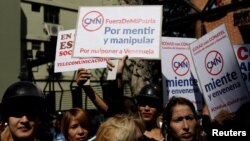Venezuela's socialist government said on Thursday it would seek to block CNN's Spanish-language service online after pulling it off the airwaves in anger at its coverage of the South American nation.
U.S.-based "CNN en Espanol" became unavailable on Venezuela's main cable providers from Wednesday, but it could still be seen on YouTube and various other websites.
"Managers are coordinating with all internet providers, using the available technology, to make the respective blocks," Andres Mendez, head of state communications regulator Conatel, told state media.
"CNN en Espanol" has often taken a tough line toward President Nicolas Maduro's government, but particularly irked authorities here with a report alleging passports were sold illegally at Venezuela's embassy in Iraq, including to members of the Hezbollah movement.
Maduro was also furious at the network for giving prominence to comments by a girl who told him on live TV that some fellow students were fainting from hunger amid the OPEC nation's deep economic crisis.
CNN has stood by its reporting on Venezuela.
"We believe in the vital role that freedom of press plays in a healthy democracy," it said in a statement on Wednesday.
On Thursday, CNN President Jeff Zucker criticized the Maduro government's move.
"When authoritarian regimes around the world start attacking journalists like that, we all have a problem," Zucker told reporters at a press luncheon in New York.
CNN's Spanish-language service could still be easily accessed online in Venezuela by mid-afternoon on Thursday.
A small group of journalists, politicians and activists protested at Conatel's office in Caracas on Thursday, where a few dozen red-shirted government supporters also rallied in support of the measure against CNN.
Venezuelan authorities took Colombia's NTN24 TV network off the air in 2014 over its reporting of opposition protests that turned violent, and blocked Argentine news site Infobae.
Opponents say Maduro, who has seen his popularity slide since narrowly winning a 2013 election to replace the late Hugo Chavez, has morphed into a dictator by jailing opponents, sidelining the opposition-led congress and delaying local elections.
The 54-year-old former bus driver and foreign minister says he is fighting against well-financed coup plotters intent on ending socialist rule in Venezuela with the help of the United States and the connivance of hostile foreign media.
Venezuela's spat with CNN has come amid rising tensions with the United States this week.
U.S. President Donald Trump has expressed concern over Venezuela in various calls with South American leaders and met with the wife of the country's best-known jailed opposition leader, Leopoldo Lopez. The U.S. Treasury Department has blacklisted Maduro's vice president on accusations of drug-trafficking.









